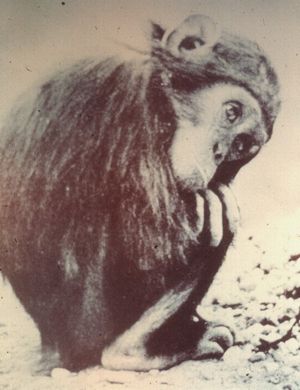Depression

Chimpanzee children,
like human children, need their mothers' care, affection,
and instruction to grow up properly. Normally, a youngster
continues to suckle from its mother's breast until four
and sometimes five years-of-age. The sudden loss of the
mother causes withdrawal and loss of appetite. Weakened,
the youngster falls prey to illness, and in some cases,
the youngster eventually dies.
Some orphaned
chimpanzees have been looked after and protected by an
older sister or another female. In one case, an adult male
adopted an orphaned male and looked after him. One sterile
female, Gigi, actually adopted several orphans and cared
for them as if she were their natural mother.
Orphans that survive are
often small for their age due to the lack of mother's
milk. Other foods nourish their bodies sufficiently to
keep them alive but they need to continue nursing until
age five or six to grow strong bones and bodies.
Captive Chimpanzees
Captive chimpanzee
infants seldom become depressed and die from the loss of
their mother. Orphaned infants in zoos are usually
hand-reared by a human surrogate mother. Thus infant
depression is seldom the cause of death. However, a
hand-reared infant must be raised using good mothering
techniques, allowing the young infant to ride clinging to
her back, making and encouraging chimpanzee sounds, and
demonstrating appropriate postures and facial gestures.
Like chimpanzee mothers, the surrogate mother must
continually encourage the infant to conquer new barriers
such as walking, climbing and vocalizations. And like good
chimpanzee mothers, the surrogate mother must always be
attentive to its safety.

